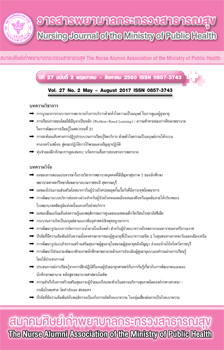ความสำเร็จในการสร้างเสริมสุขภาวะผู้ป่วยมะเร็งระยะท้ายในสถานบริการสุขภาพโดยองค์กรทางศาสนา: กรณีอโรคยศาล วัดคำประมง สกลนคร
Main Article Content
Abstract
บทคัดย่อ
การศึกษาวิจัยนี้เป็นการวิจัยเชิงคุณภาพมีวัตถุประสงค์เพื่อศึกษากระบวนการและถอดบทเรียน ความสำเร็จในการสร้างเสริมสุขภาวะระยะท้ายโรงพยาบาลการแพทย์แผนไทยและการแพทย์ผสมผสานด้านมะเร็ง สกลนคร อโรคยศาล วัดคำประมง คัดเลือกกลุ่มตัวอย่างแบบเจาะจง ประกอบด้วย พระสงฆ์ผู้นำองค์กรและเจ้าหน้าที่ผู้เกี่ยวข้อง จิตอาสา ผู้ป่วยและสมาชิกครอบครัว รวม 19 คน เก็บข้อมูลโดยการศึกษาและวิเคราะห์เอกสาร การสนทนากลุ่มย่อย และการสัมภาษณ์เชิงลึกแบบกึ่งโครงสร้าง และการสังเกตแบบมีส่วนร่วม วิเคราะห์ข้อมูลโดยการวิเคราะห์เนื้อหา ผลการศึกษากระบวนการและถอดบทเรียนความสำเร็จ สามารถแบ่งได้เป็น 4 ด้าน คือ 1) ปัจจัยด้านบริบท ได้แก่ วิถีไทย วิถีธรรม 2) ปัจจัยนำเข้า ได้แก่ อุดมการณ์ความตั้งใจที่แน่วแน่ของผู้นำองค์กรความศรัทธาต่อผู้ให้การรักษาและวิธีการรักษา สิ่งอำนวยความสะดวกและโครงสร้างอาคาร เงินบริจาค ยาสมุนไพร ผู้รับบริการและผู้ให้บริการที่มีจิตเมตตา จิตอาสา และภาคีเครือข่าย 3) ปัจจัย ด้านกระบวนการ ได้แก่ การบริหารจัดการองค์กร (ไร้กรอบ อิสระ ยืดหยุ่น) กระบวนการดูแลรักษา (ดูแลด้วยหัวใจของความเป็นมนุษย์ การดูแลสุขภาพแบบองค์รวม) และการดูแลอย่างต่อเนื่อง และ 4) ปัจจัยด้านผลลัพธ์ ได้แก่ ผลการบำบัดรักษาความพึงพอใจและคุณภาพชีวิต การยกระดับทางจิตวิญญาณ การพร้อมยอมรับ ต่อความตาย การเสียชีวิตอย่างสงบ คนทำงานมีความสุขเห็นคุณค่างานของตน ศรัทธาการยอมรับที่เพิ่มขึ้น การบริจาคทรัพย์และสิ่งของ และผลการวิจัยในด้านต่างๆ
The Success On Promote Health For Good Death In The Patients With
Cancer By Religious Organization: Arokhayasala Khampramong Temple, Sakon Nakhon
Piyawan Pokpalagon*
Suchira Chaiviboontham*
Wilailuck Thuntitrakul**
Abstract
This qualitative study aimed to synthesize lessons learned from the success on promotes well-being for good death in the Hospital of Excellence in Thai Traditional and Complementary Medicine for Cancer. The nineteen participants consisted of the leader of organizations, staffs, volunteers, and patients and families who were recruited by purposive sampling. Data were collected by documentary analysis, focus group discussion, semi-structured in-depth interviews, participatory observation, and analyzed by content analysis. The findings revealed that key success factors can be divided into 4 aspects as context, input, process and output. The context factors included Thainess culture and Dharma. The input factors included ideology and strong determination of the leader; faith to the healer and treatment; facilities and building structures; donation; herbal medicines; clients and compassionate care providers; volunteers; and network. The process factors included organization management (frameless, freedom, flexible); process of care: humanize and holistic care; and continuing of care. Output factors were results of treatments, satisfaction & quality of life; spiritual growth and development; death acceptance; peaceful death; happy workplace; faith and recognition from society increased; donation; and researches.
*Ramathibodi School of Nursing, Faculty of Medicine Ramathibodi Hospital, Mahidol University,
**Hospital of Excellence in Thai Traditional and Complementary Medicine for Cancer at Sakon Nakhon
Article Details
บทความและรายงานวิจัยในวารสารพยาบาลกระทรวงสาธารณสุข เป็นความคิดเห็นของ ผู้เขียน มิใช่ของคณะผู้จัดทำ และมิใช่ความรับผิดชอบของสมาคมศิษย์เก่าพยาบาลกระทรวงสาธารณสุข ซึ่งสามารถนำไปอ้างอิงได้

